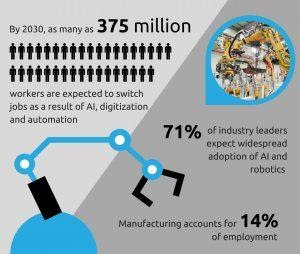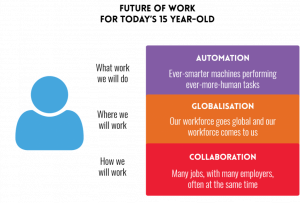
April 7,2021
Technology and Employment: Do Future Employers Need Humans?
About Technology and Employment
We’re in midst of a technological and scientific revolution. Technology is driving rapid changes in different spheres, including the workplace, our jobs, and different industries. In this changing technical landscape, will the future employers need human employees, or will robots finally take over our jobs?
Despite the Luddite predictions of impending doom with AI taking over our jobs and lives, the impressive advances in technology has had no significant apocalyptic effect on our lives. However, over time, the introduction of new technologies has in many ways impacted employment and reshaped the labour market significantly
While technology may have spawned the growth of entirely new careers, it has also led to technological unemployment. This means that the advancements in technology has rendered many occupations obsolete and led to the displacement of many workers, particularly in low-skill jobs. Today, millions of workers have been permanently eliminated from the economic process, and whole work categories and job assignments have shrunk, been restructured, or disappeared.
Reshaping the Job Market
The development of technology enabled by AI and robotics brings the promise of higher productivity, safety, increased efficiencies, and convenience. This, in turn, is expected to increase economic growth.
However, the advent of this technological revolution is also expected to raise difficult questions about automation related to jobs, skills, wages, and the nature of work itself. In short, technological innovation is expected to change the jobs people do, and how they do them.
Research by the Pew Center on the effect of employment in the future due to technological advances gathered the opinions of the nearly 1900 AI and robotics experts. The research found that the experts were divided in their opinions, with half of them saying that AI and digital agents would leave a significant number of people unemployed by the year 2025 while the other half said that technology would lead to more jobs than it would displace.
While it has been difficult to quantify the number of jobs that have been lost due to technological advancements, some changes are easy to see, particularly for monotonous, repetitive work. Operation and support of production lines and factories, document classification, call center operations, and content moderation are tasks that have been automated by machines. A McKinsey report which analyzed nearly 830 jobs and the impact of technology found that almost every occupation had aspects that could be automated. The report also found that there were very few jobs could be entirely automated. Instead of the jobs being “automated away”, the future will see a massive change in the type of jobs and roles
Automation of “Routine” Jobs
Change is the prerequisite for a growing economy. Technology, particularly the advent of machine learning and multifunctional robots, has transformed productivity and living standards, and in doing so, created new jobs. The Industrial Revolution in the 1780s is a testament to the improvement in productivity with technological innovation.
Today, Artificial Intelligence is able to extract information, create knowledge out of that information and then use it to make decisions in a number of areas. This means that instead of being bogged down by repeat, low-skill tasks such as analyzing reports, a manager can now spend more time mentoring the team and other creative pursuits. By outsourcing redundant, obsolete tasks to machines, humans are empowered to perform better at tasks that require complex analysis and creative thinking.
Upskilling: The Need of the Hour
It’s critical to note that although certain jobs may become obsolete, it does not mean those people will be out of work. Rather, some of those who are working in these occupations will transition to other occupations. The automation of routine jobs will, therefore, shift the focus to orienting a new breed of talent with multi-dimensional skills that allow them to navigate the rapidly-evolving job market. According to the World Economic Forum, nearly 65% of jobs for Generation Z have not been invented yet. As roles with repetitive tasks become redundant, there’s been an emergence of new innovative information technology careers that allow humans to perform their tasks alongside highly capable machines.
With industries adopting new technologies for higher performance and efficiency, bridging the skill gap is the need of the hour. This is not just restricted to manufacturing, clerical, and retail work but also for professions such as law, financial services, education, and medicine.
For realizing the gains to be had from adopting new technologies, there’s a need for appropriate policies and investments in creating more digital jobs and increased access to digital tools. Alongside the regulation of the liability, safety, security, and privacy of these technologies, job seekers must update themselves with relevant skills and find training programmes that enable them to work with these new technologies. This is the only way to overcome the fear arising due to unemployment and avoid worldwide social unrest
Previous
Get Free Career Advice
Related Articles

2nd April, 2021
The Skills Gap and Industry 4.0
According to a report, India will be the youngest country in the world with an average age of 29 years by 2020..

1st April, 2021
Why Data Scientists Should Embrace Graphic Analysis
Visualizing data has become an indispensable art and practice that has proven instrumental in bridging....





